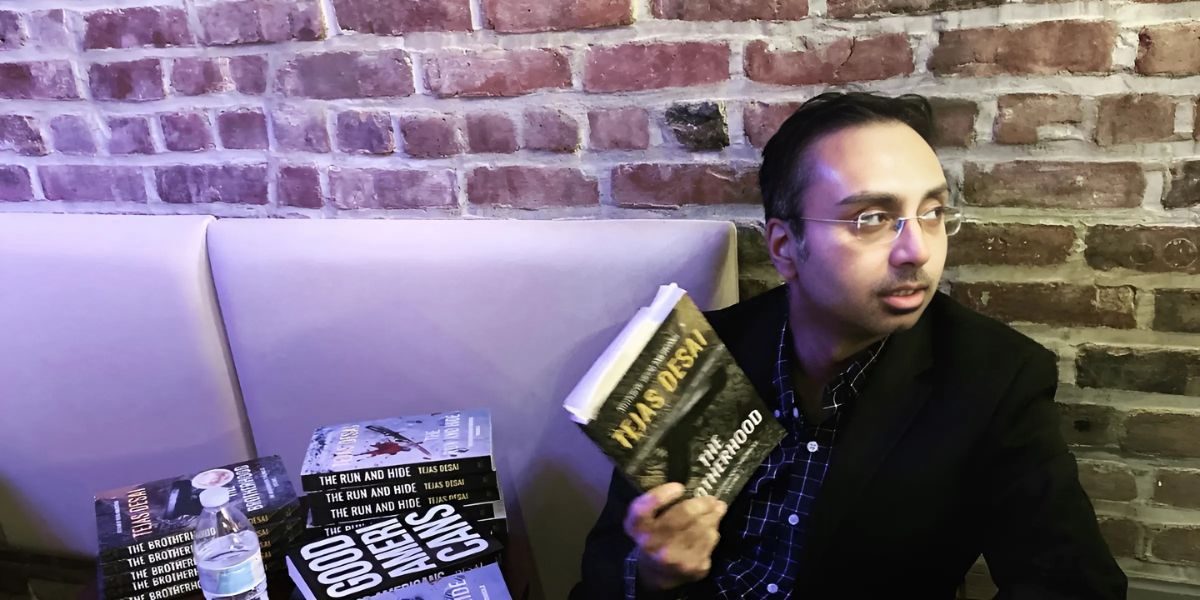By: Mike Anderson
In a literary landscape where convention often reigns, Tejas Desai emerges as a fearless innovator—a bold architect of narrative structure, emotional realism, and cultural relevance. His latest release, Bad Americans: Part I, is no ordinary pandemic-era novel. It’s a genre-defying literary hybrid: part short story collection, part frame novel, and entirely original. As the second volume of The Human Tragedy, Desai’s sweeping anthology-in-progress, this book plunges readers into the chaos, heartbreak, and unexpected beauty of American life at a moment of historic reckoning.
Desai drew critical acclaim with Good Americans (2013), a powerful collection exploring the shadows of post-9/11 America. With Bad Americans, he broadens his scope and sharpens his lens, presenting a panoramic vision of 21st-century society in all its diversity and contradiction. Deeply influenced by literary giants like Honore de Balzac, Giovanni Boccaccio, and Geoffrey Chaucer, Desai channels their spirit of social commentary while forging a voice that feels uniquely contemporary and urgent.
At the heart of Bad Americans: Part I is a strikingly inventive frame narrative: twelve pandemic survivors—each from wildly different backgrounds—are selected via a dating app competition to spend two weeks socializing at the estate of a queer tech billionaire named Oliver Mixer. During the day, they engage in competitive activities and eat extravagant cuisine, whereas each night, one of them tells a story to the group. These stories, functioning as stand-alone narratives (novelettes, a novella, even a spoken word poem) are rich and diverse in character, style, and tone—woven together not only by the overarching plot and the characters’ pandemic experiences but by the relationships, tensions, and revelations between the storytellers themselves. The result is a vibrant literary mosaic that is both intimate and epic.
The idea of merging a novel with a story collection had been brewing in Desai’s mind for decades. As an undergraduate studying abroad at Oxford during the aftermath of 9/11, Desai found himself captivated by The Decameron, Boccaccio’s 14th-century collection of plague-era tales. That early encounter sparked a long-held ambition: to craft a modern-day version, one that spoke directly to the realities of our time. “From that moment on, I wanted to challenge myself to write a contemporary frame narrative with short stories, where the frame narrative also worked as a novel,” he explains.
When the COVID-19 pandemic struck Desai’s hometown of Queens, New York—one of the first epicenters in the United States—art and life collided. Drawing on personal experience, Desai began writing Bad Americans in earnest, using the intensity and uncertainty of the moment to shape not only the stories but the voices behind them. To ensure authenticity, he collaborated with beta readers from diverse communities and professions, mirroring the racial, cultural, and economic spectrum his characters inhabit. The result is a cast of characters who feel fully alive—flawed, complex, and profoundly human.
What makes Desai’s work so compelling is not just its formal ambition, but its unflinching gaze. Bad Americans confronts the urgent issues of our time—immigration, inequality, gender politics, race, and moral conflict—with empathy and intelligence. The stories vary wildly in tone, from dark humor to raw emotional drama, yet together they create a layered, truthful portrait of a nation in crisis. Desai’s commitment to “gritty realism” isn’t about shock value—it’s about reflection, and ultimately, connection.
Desai also broke with tradition in how he chose to publish the work. Rather than release Bad Americans as a single volume, he opted for a serialized approach—releasing each of the twelve internal stories monthly, like singles from a concept album. “If musicians could do it for their albums, why couldn’t I do it for a short story collection?” he says. It’s a move that reinforces the originality of the work while giving each story space to resonate on its own terms. And just like tracks on a powerful album, each tale gains additional meaning when experienced as part of the full collection.
Each “single” contributes not only to the broader themes of the work but also to the intricate social dynamics of the frame narrative. Readers are invited to consider not just the stories themselves, but how the tellers are shaped by them—and how their lives are subtly changed in the telling. It’s storytelling within storytelling, a layered narrative experience that reflects the fractal complexity of modern America.
More than just a literary experiment, Bad Americans is a defining installment in Desai’s long-term vision. Modeled after Balzac’s monumental The Human Comedy, The Human Tragedy seeks to document the full scope of American life in the 21st century—its triumphs, failures, contradictions, and moments of grace. “Balzac is my all-time hero,” Desai says. “And the goal of The Human Tragedy is to do with 21st-century New York City and America what Balzac did with 19th-century Paris and France.” With Bad Americans, Desai takes a major step toward fulfilling that promise, offering a literary work that feels both timely and timeless.
Building on the foundation of Good Americans, which focused on society’s margins, Bad Americans: Part I now brings together both ends of the spectrum—placing essential workers beside billionaires, recent immigrants beside legacy elites, pandemic trauma beside unearned privilege. Every voice is given weight. Every story pushes the conversation forward.
Despite its roots in classical literature and its nods to pop culture (The Decameron, The Canterbury Tales, Big Brother, The Bachelor), Bad Americans never feels derivative. It feels necessary. The characters don’t simply survive the pandemic—they expose its emotional and cultural fault lines. Through Desai’s careful crafting, these stories become a mirror of a society in flux—and a testament to the resilience of storytelling itself.
As Desai continues disseminating the series (Bad Americans: Part II is slated for 2026), readers can look forward to even more bold storytelling, sharp insight, and rich characterization. In a time when the world is still reckoning with the pandemic’s aftermath, Bad Americans offers no easy answers—but it does offer something far more meaningful: a space for reflection, empathy, and truth.
Be among the first to dive into Desai’s bold new vision—Bad Americans: Part I is available now for preorder.

















